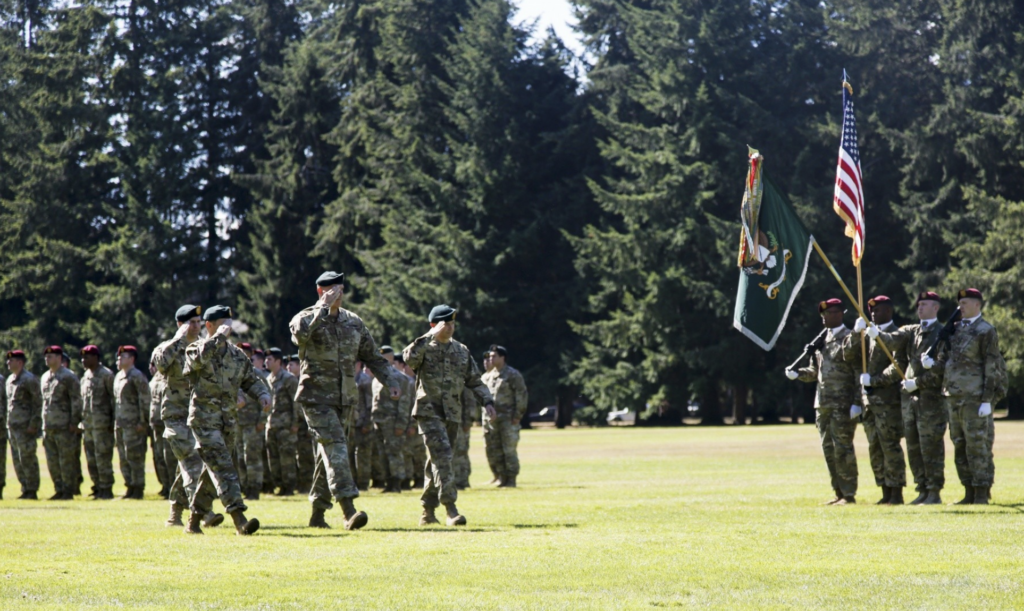The Army is seeking to revoke the Special Forces tab of a retired colonel who was arrested in 2020 for domestic violence, Task & Purpose has learned.
1st Special Forces Command has initiated action to revoke the tab of retired Col. Owen Ray, according to an official within U.S. Army Special Operations Command. Ray, the former commander of 1st Special Forces Group, was arrested and charged with domestic violence and assault in 2020 after a two-hour standoff with police. At the time of his arrest, Ray was serving as the chief of staff of I Corps at Joint Base Lewis McChord, Washington. He was ultimately approved for an honorable discharge in 2021 and retired.
The revocation of his Special Forces tab is an effort to make clear that Ray’s actions “don’t represent the Special Forces community or the high standards we expect in the community,” the official said. The action has been sent to Ray and his lawyers, who have until the end of next week to submit a rebuttal.
Jared Ausserer, an attorney who represents Ray on his civilian criminal charges but is not representing him on the revocation of his tab, confirmed that the Army has initiated the process. Efforts to reach Ray and his military attorneys were unsuccessful.

Ray was arrested in the early morning hours of Dec. 27, 2020, after he allegedly threatened his wife with a handgun in their home. According to charging papers first reported by the Tacoma News Tribune, he and his wife were arguing when she hid from him in their youngest child’s bedroom. She heard him say “let’s do this,” according to the News Tribune, before he went to the garage “where he stored his guns.”
He allegedly came back into their child’s bedroom and became “furious when she called police.” The charge sheets said that Ray pointed a gun at his wife and proceeded to kick her “over and over with his boots in the face and chest.”
“The two children had woken up and were screaming, ‘Don’t kill mom, don’t shoot us,’” the charge sheets said, according to the News Tribune.
Ray “refused to comply” with orders from police officers upon their arrival to the home, and “refused to disarm or surrender” as his family was evacuated. He ultimately surrendered and was taken into custody two hours after police arrived. He was charged with two counts of assault in the second degree with a firearm, two counts of felony harassment, kidnapping in the first degree, and reckless endangerment.
Complaints about Ray’s behavior predate the 2020 incident. An Inspector General complaint from his time as the 1st Special Forces Group commander accused him of creating a “toxic command climate” and “setting expectations that everyone should act like him.”
“He exacerbates this expectation by shaming people in public and berating them,” a statement included in the IG complaint said, according to Military Times. “Additionally, he regularly overreacts on little information and has emotional outbursts.”
In an op-ed in The Cipher Brief last November — a media outlet focused on national security, according to its website — Ray pointed to deteriorating mental health and post-traumatic stress disorder as reasons behind the events of December 2020. He said he “suffered in the dark and I could no longer maintain the warrior, leader and family expectations.” He was “devastated” and “confused” after his arrest, he wrote, adding that he was “vilified by the media.”
Once Ray and his lawyers decide to file a rebuttal to his tab revocation, should they choose to do so, the final recommendation will be sent to Maj. Gen. Thomas Drew, commander of Army Human Resources Command, for a final decision.
The Special Forces tab “means something to people,” the official within Army Special Operations Command said. “They’re using tab revocation as a tool to police the profession within the Special Operations Forces community.”
What’s hot on Task & Purpose
Want to write for Task & Purpose? Click here. Or check out the latest stories on our homepage.
